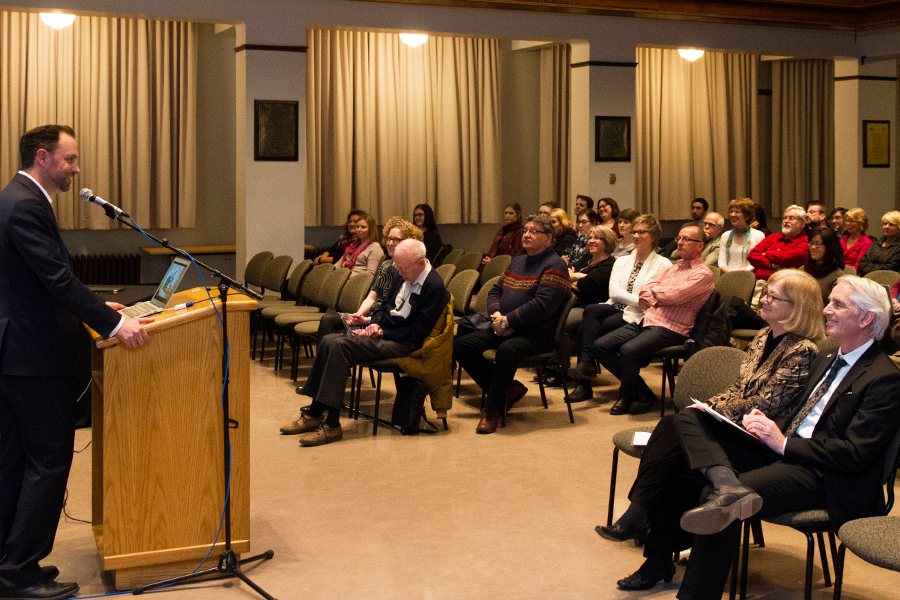
U of S partners with National Centre for Truth and Reconciliation
SASKATOON - The University of Saskatchewan (U of S) and the National Centre for Truth and Reconciliation (NCTR) have signed a memorandum of understanding (MOU) to provide access to information on Canada's history with Indigenous Peoples.
"We are committed to supporting Indigenous education and reconciliation," said Peter Stoicheff, U of S president and vice-chancellor. "The opportunity to partner with this unique centre of national and international significance is an important part of our commitment."
Stoicheff said the partnership will provide opportunities for researchers and students at the U of S and the broader community, including residential school survivors, to access the vast resources and programs of the NCTR.
The NCTR, located in Winnipeg and hosted on the University of Manitoba campus, is the permanent electronic archive for all statements, documents, and other materials gathered by the Truth and Reconciliation Commission of Canada. The archives currently hold approximately five million electronic records on the NTRC database, with about 40,000 records available for public access.
The U of S joins eight other Canadian post-secondary institutions as the newest partner in this national network. Through the agreement, the U of S will support the ongoing work of the NCTR and help in practical ways to make access to the centre's electronic resources easier, explained Vicki Williamson, dean of the University Library.
"For example, we will shortly be placing a link to the NCTR database on our library public computers," said Williamson. "Our librarians are being trained to effectively navigate the database and in turn assist local users. Not everyone can travel to Winnipeg to search the NCTR database and archives. Making that available here at the U of S is an opportunity to assist our campus and local communities."
Williamson said the partnership may allow the U of S to add resources and expand the records available through the NCTR, especially given the university's experience developing digital collections like the Indigenous Studies Portal (iPortal) and the U of S contributions to Saskatchewan History Online (SHO).
"This places us in a position to contribute to the centre's digitization program and we are excited to contribute to the NCTR's digitization work in the future," she said.
Williamson said that over time some other colleges and units will likely take advantage of the partnership agreement to make a contributions and support the ongoing reconciliation work of the NCTR. The College of Law's Native Law Centre and the Diefenbaker Canada Centre, for example, are currently exploring possibilities.
For more information, contact:
James Shewaga
Media Relations Specialist
University of Saskatchewan
306-966-1851
james.shewaga@usask.ca
Stoicheff said the partnership will provide opportunities for researchers and students at the U of S and the broader community, including residential school survivors, to access the vast resources and programs of the NCTR.
The NCTR, located in Winnipeg and hosted on the University of Manitoba campus, is the permanent electronic archive for all statements, documents, and other materials gathered by the Truth and Reconciliation Commission of Canada. The archives currently hold approximately five million electronic records on the NTRC database, with about 40,000 records available for public access.
The U of S joins eight other Canadian post-secondary institutions as the newest partner in this national network. Through the agreement, the U of S will support the ongoing work of the NCTR and help in practical ways to make access to the centre's electronic resources easier, explained Vicki Williamson, dean of the University Library.
"For example, we will shortly be placing a link to the NCTR database on our library public computers," said Williamson. "Our librarians are being trained to effectively navigate the database and in turn assist local users. Not everyone can travel to Winnipeg to search the NCTR database and archives. Making that available here at the U of S is an opportunity to assist our campus and local communities."
Williamson said the partnership may allow the U of S to add resources and expand the records available through the NCTR, especially given the university's experience developing digital collections like the Indigenous Studies Portal (iPortal) and the U of S contributions to Saskatchewan History Online (SHO).
"This places us in a position to contribute to the centre's digitization program and we are excited to contribute to the NCTR's digitization work in the future," she said.
Williamson said that over time some other colleges and units will likely take advantage of the partnership agreement to make a contributions and support the ongoing reconciliation work of the NCTR. The College of Law's Native Law Centre and the Diefenbaker Canada Centre, for example, are currently exploring possibilities.
-30-
For more information, contact:
James Shewaga
Media Relations Specialist
University of Saskatchewan
306-966-1851
james.shewaga@usask.ca

